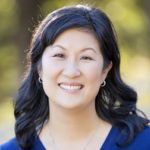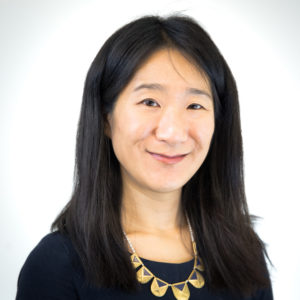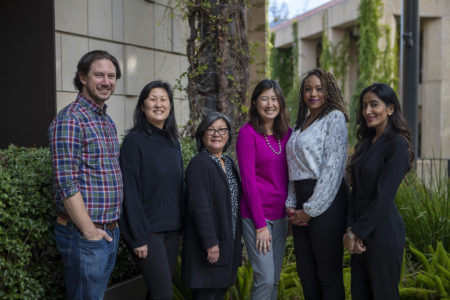Executive Director's message
Be the change you wish to see in the world . . . – Gandhi

It has been a long year and I know many of us feel like we are limping to the finish line as the school year draws to a close. We are almost there and I know our 1Ls, in particular, will rejoice. Next year brings the opportunity to take a clinic and a wider array of courses now that they’ve finished the required 1L curriculum. Yet it also brings the exciting opportunity to finally meet people in person!
I always find this time of year to be a bit bittersweet because it means saying goodbye to our graduating students. I’m truly excited that the members of the class of 2021 are about to embark on a new chapter in their lives. I can’t wait to hear how they will make their marks on the world. Yet I know I will miss them as they start their post-law school careers in nonprofits, government agencies, private firms, and judicial chambers.
Our newest graduates did not have a typical Stanford Law School experience, let alone a final year filled with a lot of class activities and day trips to amazing Bay Area destinations. We missed so many opportunities to see each other at events, in the Law Cafe, or out at the patio tables in Crocker Garden. I’m so thankful that we will have a chance to say goodbye in person with a small in-person celebration at Wilbur Field after finals end.
I also want to thank the Class of 2021 for selecting me for the Staff Award, which is presented to the staff person, administrator, or faculty member “who has played an integral role in the lives of the graduating students.” I am so honored to be recognized and accept this award on behalf of our entire Levin Center team. Our collective efforts have helped create a strong, supportive public interest community at SLS and beyond.
In this issue, you can read a profile about Eunice Cho, JD ’09, whose incredible work advocating for immigrant rights is so inspiring; scan the list of new and recent graduates starting their careers in public service this Fall; watch the video from our virtual Spring Public Interest Awards ceremony (which included a lovely tribute to Professor Deborah L. Rhode); and learn more about Pro Bono Program news.
Good luck with finals, students. I look forward to welcoming the returning students back to campus in the Fall and seeing the graduates from the class of 2021 back on campus at future reunions. I hope everyone has a safe and enjoyable summer.
Sincerely,
Anna
Alumna's Community Organizing Background Greatly Informs Her Immigrant Rights Advocacy

Eunice Cho, JD ’09, has been firmly rooted in her commitment to empowering vulnerable communities for over two decades. As the child of immigrants in Phoenix, Arizona, she watched as her family and friends faced racism, harassment, and deportation, which led her to her longtime immigrant rights work. She is currently a senior staff attorney at the ACLU National Prison Project in Washington, DC, where she focuses on challenging unconstitutional conditions of confinement in immigration detention and works to end the country’s mass immigration detention system.
Over the past 12 years, Cho has worked as an attorney for several incredible civil rights organizations around the country. She has lobbied for policies and legislation to protect immigrant workers’ rights and litigated on behalf of immigrants and prisoners against unconstitutional law enforcement abuse and conditions of confinement.
After graduating from Yale University in 2000, Cho spent six years working as a community organizer for the National Network for Immigrant Refugee Rights in Oakland, CA. Cho worked to build grassroots alliances in support of immigrant communities in the xenophobic climate that followed 9/11, developed anti-racist popular education curricula, mobilized migrant and refugee rights groups to participate in the 2001 UN World Conference Against Racism, and co-authored multiple reports on immigration and race.
Cho explains, “I went to law school because I had spent several years working as a community organizer in the immigrant rights movement, and believed that a law degree could give me additional skills to support immigrant communities. I hoped to bring the skills and access that a J.D. degree would provide back to a broader immigrant rights movement.”
She adds, “It may be naïve, but it was a huge shock to enter a profession that was so hierarchical. I am grateful for the grounding that working as an organizer gave me. It also taught me very clearly the limited and supportive role of lawyers in working with social movements.”
Cho notes, “I did not particularly enjoy law school. I’ve come to realize that many of the legal colleagues who I have most trusted and admired also found law school to be alienating. So you are not alone if you are having a hard time. The late Prof. Derrick Bell gave me some very helpful advice on surviving law school with your heart and soul intact. He told me that law school is a training ground to understand how people in power think and work. It is a place to observe carefully how they operate and make decisions, and that it would not always be easy, because so much of the way that the law works is inherently violent and oppressive. If your purpose is to build power for those who do not have it, instead of achieving personal power or wealth, this is an extremely important lesson to remember.”
Cho adds, “Some of the most powerful experiences that I had at Stanford Law School were made possible by the wealth of resources and opportunities at students’ disposal. Even if the law school does not offer a particular class, clinic, or faculty expert in an issue area or theoretical perspective that you want to pursue, it is possible to put together the opportunities to do so. If you are lucky, you can even simultaneously support community organizations. My proudest memories come from the opportunity to organize symposia at SLS featuring abolitionist thinkers, including Prof. Dorothy Roberts and Prof. Ruthie Gilmore, and organizing panels featuring thinkers from community groups and movement organizations, with the support of honoraria funds from the law school. (Remember to pay people for their labor of preparing and speaking at the law school.)”
Cho also had the opportunity to participate in one of the Levin Center’s Alternative Spring Break trips. She shares, “It was an eye-opening experience to organize and participate in a spring break service trip, sponsored by SLS, with No More Deaths, a humanitarian organization in Arizona dedicated to stopping the deaths of migrants in the desert. Hiking through the desert on migrant trails near the U.S.-Mexico border, providing direct aid, filling water stations for stranded migrants, and documenting human rights abuses by the Border Patrol provided me with a deeper understanding of many of my future clients’ experiences than any class I attended in law school.”
After graduation and a clerkship on the Ninth Circuit with Judge Kim McLane Wardlaw, Cho served as a Skadden Fellow at the National Employment Law Project in Oakland. She states, “I worked to secure U visas (visas for victims of crime) on behalf of over a hundred immigrant poultry plant workers in rural Mississippi, all of whom had faced extortion and/or sexual and racist harassment by their employers, deploying a novel theory to obtain certifications from the EEOC. I also worked to push through policy change and legislation to protect immigrant workers from retaliation after standing up for their rights within the Obama administration and in various state legislatures. This experience was invaluable in learning how to use administrative and legislative advocacy to achieve key policy goals.”
Three years later, Cho moved to Atlanta, Georgia to join the Southern Poverty Law Center. As a staff attorney, Cho litigated and advocated on behalf of immigrant workers and people in immigration detention and prison. She shares, “Living and working in the deep South was an important experience for me. It was eye-opening to see the level of abuse committed by the police, ICE, entire prison and detention systems, and courts take place, with such little institutional challenge. Yet it was the place where I witnessed some of the most beautiful, resilient community organizing and movement building.”
Cho relocated to Seattle three years later and began working at the ACLU of Washington, where she litigated a number of cases on behalf of immigrants in detention, prisoners, and students with disabilities. She notes, “It was a marked change from the deep South, culturally and politically, and an inspiring place to see affirmative legislative campaigns on behalf of immigrant communities.”
Two years after joining the ACLU of Washington, Cho then moved to Washington, DC to work at the ACLU National Prison Project, where this past year, she led the ACLU’s litigation campaign to ensure the safety of people in immigration detention during the COVID-19 pandemic.
Cho explains, “The ACLU—with its affiliates and partner organizations—brought more than 40 cases on behalf of detained people in 32 facilities nationwide, resulting in the direct release of more than 800 people, as well as population caps on facilities limiting the detention of even more. These cases started because my colleagues and I began to worry that prisons, jails, and detention centers would have no plan to deal with COVID-19. Unfortunately, this fear became all too real, with deadly consequences for thousands of people.
“At the start of the pandemic, on March 13, 2020, ICE issued a press release discussing its response to the pandemic, stating that ‘ICE only has authority to detain individuals for immigration purposes. ICE cannot hold any detainee ordered released by a judge.’ I looked at that line and concluded we should sue to obtain judicial orders to release people from detention in light of the pandemic. The ACLU, Northwest Immigrant Rights Project, and the ACLU-WA filed a lawsuit a week later on behalf of immigrants detained in Washington state, one of the first hotspots in the pandemic. This became the first of dozens of cases to come.”
Cho notes, “This work was extraordinarily rewarding, but also challenging in that it took place at the very same time that we all were adjusting to life under the pandemic. Our team worked to mount dozens of cases in the space of weeks, working at a frenzied pace, in courts around the country.
“At the same time, we were all adjusting to working remotely. My partner and I struggled to balance our more than full-time work while trying to keep an eye on our toddler, without childcare. Some of my co-counsel and I started to schedule calls at midnight, because we knew we’d be up working anyway, and our kids would be asleep. My son watched a lot of TV (PBS Kids, I tell myself), and he began to believe that online meetings were my favorite thing to do.
“But each time we received photos from clients who had gained release from detention as a result of our work, we’d all pause, and savor the freedom we had fought to gain. As my colleague, Michael Tan (Deputy Director of the ACLU Immigrants’ Rights Project, who coordinated this litigation campaign with me), and I would say to each other each time someone was released, ‘There is truly nothing better in the world than to see a client free from detention.’”
SLS Virtually Celebrated Students and Memorialized Professor Deborah L. Rhode
On Tuesday, May 18, the Levin Center and the Office of Student Affairs jointly hosted our virtual Spring Community Leadership and Public Service Awards reception. Dean Jenny Martinez gave a live welcome speech, congratulating the award recipients, recounting the past year, and noting our graduates’ Pro Bono Service.
The Leon M. Cain Community Leadership Award was presented to Peggy Xu, JD ’23; Celina Malavé, JD ’22; and Trillium Chang, JD ’21. The Deborah L. Rhode Public Interest Award was presented to Trillium Chang, JD ’21; Carolina Herrera, JD ’21, and A.D. Lewis, JD ’21. The Lisa M. Schnitzer Memorial Scholarship was presented to Elóra Henderson, JD ’23.
The pre-recorded program included acceptance speeches by the award recipients and a tribute to Professor Deborah L. Rhode. A recording of the event can be viewed here.
We also prepared a slideshow that showcased the names of all the alumni who will be starting entry-level public interest jobs this Fall. That slideshow can be viewed here. SLS will fund 14 postgraduate public interest fellows who will start their fellowships this Fall. You can read more about the nine general SLS Fellows here; the two SLS International Fellows here; the SLS Civitas Fellow here; the SLS Criminal Defense Fellow here; and the International Court of Justice University Traineeship Fellowship here.
Pro Bono Program Continues to Grow and Added Two New Projects This Year
We are delighted to recognize 115 members of the Class of 2021 who will graduate with pro bono distinction. This class has distinguished itself by performing 20,737 hours of pro bono service during their time at the law school. That equates to just over 2,592 days of one attorney’s work or, otherwise put, just about 10 years of one attorney’s full-time work.
Twenty four of our graduates performed 300 or more hours and will graduate with Highest Pro Bono Distinction. Forty will graduate with High Pro Bono Distinction for performing between 150 to 299 hours. Fifty one performed between 50 to 149 hours and will graduate with Pro Bono Distinction.
This year, two new pro bono projects were started by students. The Transgender, Gender-Variant & Intersex (or “TGI”) Pro Bono Project—started by A.D. Lewis, JD ’21, Highest Pro Bono Distinction), Bruce Easop, JD ’22, and Frances Tinney, JD ’22—recruited nine first-year students to join in its work. Students logged nearly 180 hours working through that project.
Furthermore, the Small Business & Entrepreneurship Pro Bono Project—started by Tyler McClure, JD ’22, Justin Garfinkle, JD ’22, Guillaume Julian, JD ’22, and David Liou, JD ’22—recruited 13 first-year students to join its work. They logged nearly 200 hours.
The Stanford Lawyer recently profiled the Small Business and Entrepreneurship Law Project.
We also have an estimated 50 faculty, staff, and instructors who have performed at least 50 hours of pro bono service over the past year.
About Create Change

Create Change is designed and produced quarterly by the staff of the John and Terry Levin Center for Public Service and Public Interest Law. Unless specifically noted, all articles are written by staff:
Associate Dean for Public Service and Public Interest Law: Diane T. Chin
Executive Director: Anna Wang
Director, International Public Interest Initiatives: Titi Liu
Director, Pro Bono and Externship Programs: Mike Winn
Public Interest Counselor: Shafaq Khan
Program Manager: Chelsea Jones
To be notified when new issues of the newsletter are available, please visit this website.
Create Change is published via email and past issues are available on our website. Articles, letters, and photos are welcome. Please send them to public.interest@law.stanford.edu.
You can visit us on the web at:
law.stanford.edu/levin-center
www.facebook.com/levin-center

